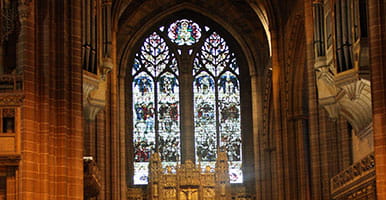Gerry Marsden MBE
Presented by Professor Frank Sanderson
Honorable Chancellor, I have pleasure in presenting Gerry Marsden for the award of an Honorary Fellowship from Liverpool John Moores University.
Gerry Marsden with his group the Pacemakers had the best start of all the Merseybeat groups of the 1960s, including the Beatles, with their first three songs all making Number 1 in the charts, a record which stood for over two decades. Since then, Gerry has remained close to his roots, becoming a much-admired ambassador for his home city and a welcome supporter of many local, national and international charities.
Gerard Marsden was born in Liverpool in 1942, the second son of Mary and Frederick Marsden and grew up in the Dingle area of the city. As a five-year-old, he remembers standing on an air raid shelter singing 'Ragtime Cowboy Joe' and being applauded by onlookers – and it was then that he knew what he wanted to do in life.
He attended Our Lady of Mount Carmel School and learned to box and to play the guitar at the Florence Institute Youth Club – the Florrie. After a particularly painful defeat to his friend and future world champion Alan Rudkin, he gave up boxing and formed a group with his brother Freddie called Gerry Marsden and the Mars Bars. But then the Mars company missed a marketing opportunity when they demanded that the name be changed.
After a short period as the Gerry Marsden Trio, Arthur McMahon joined the group and they became Gerry and the Pacemakers – the idea coming after Gerry watched an athletics race which had one runner as a pacemaker.
In 1960 Gerry gave up his job on the railways to turn professional and to take up a two-month contract in Hamburg – where many other groups, including the Beatles, honed their skills.
Back in Liverpool Gerry and The Pacemakers and The Beatles were making names for themselves and often toured together in the early 1960s. Gerry recalls the time on tour when John Lennon asked his opinion of a new song he'd written called 'I Want to Hold Your Hand'. Gerry told him it was terrible, and of course, the song went straight to No. 1 in the charts.
Years later, after hearing Paul McCartney's 'Mull of Kintyre' for the first time, Gerry declared on radio that it was a load of rubbish and wouldn't be a hit. It became one of the biggest selling records of all time...
Beatles manager Brian Epstein signed Gerry and the Pacemakers in 1962 and later that year George Martin signed them to EMI Columbia. But they had not yet hit the big time: Mersey Beat's Bill Harry wrote in January 1963 that they had "played in numerous towns and cities such as Manchester, Fleetwood, Rhyl, Morecambe, Crewe, and Northwich". Later that year, everything changed.
George Martin produced 'How Do You Do It' at Abbey Road Studios after it was turned down by Adam Faith, and the Beatles refused to release their version. It became a Number 1 for Gerry and the Pacemakers in 1963. Next, 'I Like It' went to No. 1 and stayed there for a month.
They completed their hat trick of Number 1s with a cover version of the Rogers and Hammerstein composition from Carousel, 'You'll Never Walk Alone' – a song Gerry had loved ever since he saw Carousel in 1956. This is the song he is most remembered by as it was adopted by Liverpool FC as their anthem.
Today, the song remains a football anthem, at Anfield and elsewhere, a phenomenon due to Gerry Marsden rather than its Broadway composers.
It goes without saying that Gerry is an avid Liverpool supporter though he was actually an Evertonian until he was 13 – all his family were Evertonians, and he just got fed up with everyone agreeing with each other after matches.
The band's popularity was such that they were soon on sell-out tours across the world. On the Ed Sullivan Show in May 1964 they performed Gerry's composition 'Don't Let the Sun Catch You Crying' which became a U.S. hit. On the show, Gerry recalls, "we were wined and dined and treated like royalty and we were just four scallies from Toxteth."
The scally humour was never far away, he remembers telling one US interviewer that before he became a musician he'd been a boxer, and he'd come from a whole family of boxers apart from his brother, he was an Alsatian. He recalls that the interviewer just didn't get it.
Gerry continued to write a lot of the band's material, and wrote most of their subsequent hits, including 'It's All Right' and 'I'm the One'. He also wrote much of the soundtrack for the 1965 film, Ferry Cross the Mersey. The Musical Theatre production of this film enjoyed a sell out premiere in Liverpool and went on to a successful tour of the UK, Australia and Canada.
The Mersey Sound peaked in the mid 1960s and Gerry became a popular cabaret and children's TV entertainer. From 1968-1971, he appeared in the musical comedy Charlie Girl in the West End alongside Anna Neagle and Derek Nimmo. The Pacemakers were reformed in the 1970s but not with the original members, and Gerry and the band toured the world.
Gerry returned to No. 1 in the charts twice during the 1980s with re-recordings of two of his old hits, with all profits going to charity. In 1985 after the Bradford City Stadium fire in which 56 were killed, he formed a group called The Crowd, which included other musicians, singers, and radio disc jockeys, to produce a new version of 'You'll Never Walk Alone'.
'Ferry Cross the Mersey' was revived in 1989 as a charity single for an appeal in response to the Hillsborough disaster which left 96 dead, giving Gerry Marsden, in association with other Liverpool stars, including Paul McCartney and Holly Johnson, another British number one.
In 1993, Gerry published his compelling autobiography, I'll Never Walk Alone In the 21st Century, Gerry still performs all over the world and has enjoyed recent successful tours of Australia and America.
In 1963, Bill Harry wrote, "Gerry's the most happy-go-lucky personality on the Merseyside scene, he doesn't take life too seriously, and he likes people."
Not far off 50 years later that description remains true, with Gerry cheerfully and tirelessly involving himself in work for many charities, not least Claire House Children's Hospice.
In 2003 he was awarded the MBE in the Queen's Birthday Honours List for his services to charity. He has been honoured with the Freedom of the Ferries and last year with the Freedom of the City of Liverpool at a ceremony on board the Mersey Ferry Royal Iris for his charity work and for his contribution to Liverpool life.
Liverpool John Moores University is delighted to follow the example of the City and award this great ambassador for Liverpool our highest honour for his outstanding contribution to the performing arts, to charity and to Liverpool Life.
Thus I have pleasure in presenting Gerry Marsden, this most distinguished son of our city, for admission to our highest honour of Fellow of Liverpool John Moores University.



